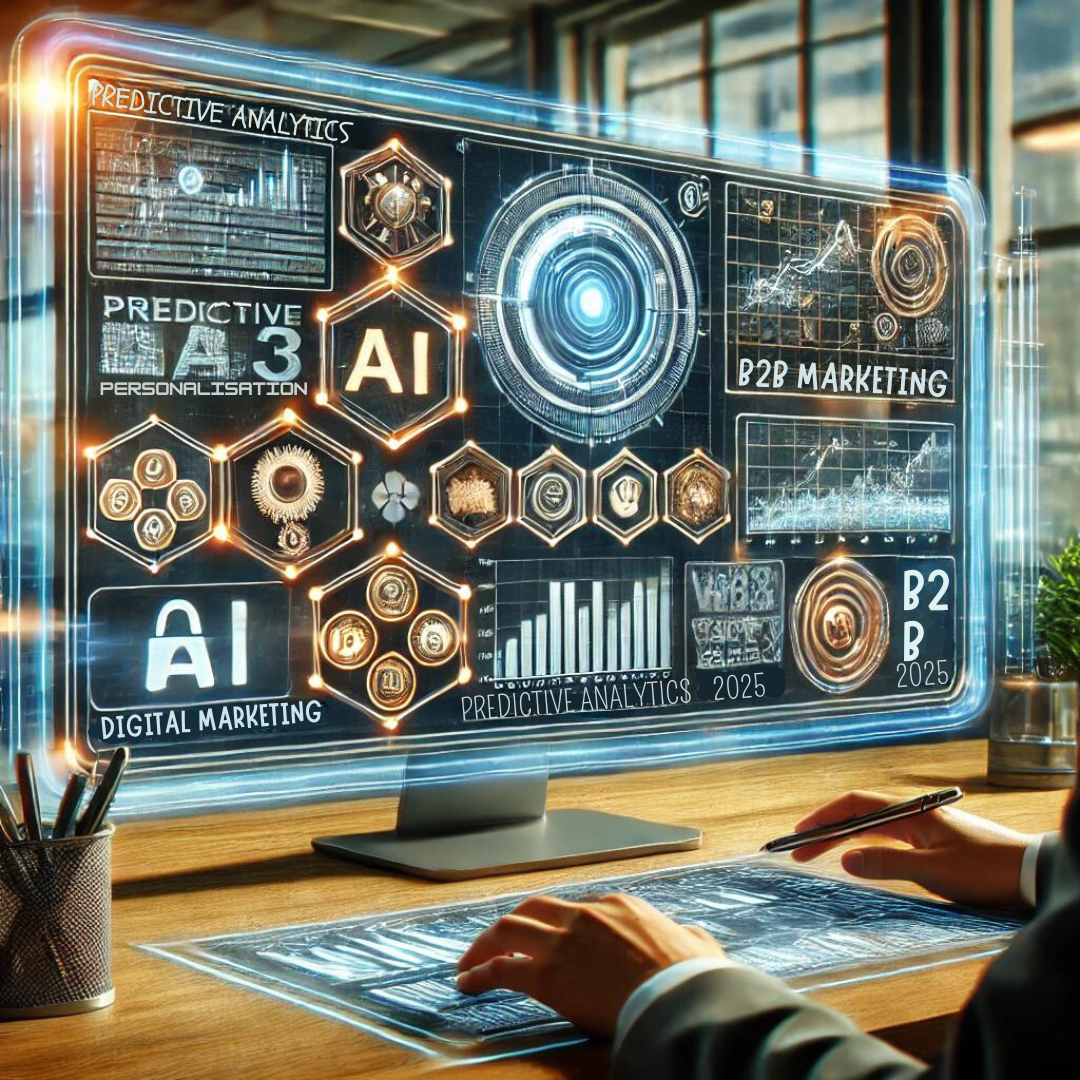How emerging trends like Web3, AI, and data-driven marketing will shape the future
The future B2B marketing trends are evolving at an unprecedented pace, driven by rapid advancements in technology and shifting buyer expectations. To stay ahead, businesses must adapt to the best strategies for B2B growth in 2025, focusing on innovation and data-driven marketing. In the year ahead, staying competitive will require businesses to not only keep up with these changes but to anticipate and embrace them. Advanced technologies like AI-powered automation, Web3, and predictive analytics are transforming how marketers engage with prospects and clients, while personalisation and customer-centric strategies are becoming essential to driving success.
As businesses look ahead, it’s clear that those who adapt to these innovations will be best positioned to thrive in an increasingly complex marketplace. From leveraging first-party data for privacy-first marketing to optimising the customer journey with AI, the strategies shaping B2B marketing in 2024 are not just about efficiency—they’re about building meaningful, data-driven relationships.
To succeed in this environment, marketers must be agile, innovative, and ready to capitalise on the opportunities created by these trends. Now is the time to adopt forward-thinking strategies that will set businesses apart in the ever-changing B2B marketing landscape. The following key trends will help you navigate this exciting future and stay ahead of the competition.
Only 1% of B2B marketers are not personalising their efforts
Why Hyper-Personalisation Will Be the Key to Customer Satisfaction
Among the best strategies for B2B growth in 2025, personalisation remains a key driver of success. In today’s competitive B2B landscape, personalisation has become more than just a trend—it’s a necessity for businesses looking to stay ahead. According to ON24’s “Personalization in the AI Era” report, only 1% of B2B marketers are not personalising their efforts, and 88% plan to leverage AI to enhance personalisation. AI and data analytics enable hyper-personalised marketing by analysing customer behaviours and preferences, allowing marketers to tailor campaigns to specific accounts and decision-makers. The strategy behind data-driven personalisation centres on customer-centricity, focusing on building genuine connections through customised experiences rather than merely pushing products or services. The ON24 report highlights that 52% of B2B marketers personalise based on account segments, while 46% focus on named accounts. By tapping into this data, businesses achieve higher engagement, faster conversions, and improved customer satisfaction, making personalisation a key driver of marketing success in 2025.
Account-Based Marketing (ABM) 2.0
Over the next 12 months, Account-Based Marketing (ABM) is set to become more advanced with the integration of AI and automation, allowing for greater scalability without sacrificing personalisation. AI enables marketers to gather data-driven insights that enhance account targeting and create more meaningful engagements at scale. This shift makes it easier to deliver highly tailored content and experiences to key accounts, ensuring long-term value and deeper relationships. A crucial element of ABM’s success is the alignment between marketing and sales teams, which ensures a unified approach to targeting high-value leads. According to G2, 73% of marketers report that ABM increases deal sizes by focusing on lead quality, showing its potential to generate more significant business outcomes. Moreover, 42% of marketers are already personalising content to boost account engagement, a trend that will continue to grow as ABM strategies evolve. With ABM 2.0, businesses can drive higher-value deals by nurturing relationships through customised, data-driven approaches, making it an indispensable strategy for B2B marketing in 2025.
45% of B2B marketers identify video as the most effective content medium
How Video and Interactive Experiences Engage B2B Buyers
In the evolving B2B marketing landscape, video content and interactive tools are set to play a central role, as they increasingly influence buyer decisions. With 45% of B2B marketers identifying video as the most effective content medium, it has surpassed traditional formats like articles, case studies, and infographics. Visual storytelling, particularly through product demos, client testimonials, and case studies in short video formats, allows brands to connect with decision-makers on a deeper, emotional level. These formats help build trust and simplify complex messages, making it easier for prospects to engage with and understand the value being offered. Interactive content, such as webinars, quizzes, and virtual demos, also enhances engagement by allowing potential buyers to actively participate in the experience, thereby deepening their connection to the brand. This combination of video and interactive content not only humanises the marketing process but also offers a more dynamic and impactful way to capture attention, leading to faster decision-making and improved business outcomes.
61% of high-growth companies are shifting toward first-party data for their personalisation strategies
The Shift to First-Party Data and Privacy-First Marketing
As third-party cookies are phased out and privacy regulations tighten, first-party data is becoming essential for B2B marketers in 2025. With growing concerns around data privacy, clients are seeking more transparency from businesses on how their data is collected and used. Companies that adopt privacy-first marketing strategies—focusing on transparency and ethical data practices—are well-positioned to build stronger relationships with their customers.
First-party data, which is collected directly from clients through interactions like website visits, CRM tools, and email engagement, offers more accurate insights than third-party data. By relying on these direct sources, businesses can deliver hyper-personalised marketing while staying compliant with privacy regulations such as GDPR and CCPA. Deloitte reports that 61% of high-growth companies are already shifting toward first-party data for their personalisation strategies, underscoring the critical role it plays in effective marketing.
For B2B companies, leveraging first-party data provides opportunities for better targeting, improved customer relationships, and higher-quality personalisation without breaching privacy boundaries. Marketers who embrace this trend are not only protecting their reputation but also future-proofing their data strategies in a privacy-first world.
The Rise of Web3 and Decentralised Marketing
Looking ahead to the near future, Web3 technologies—such as blockchain, tokenization, and decentralised platforms—are set to unlock new opportunities for B2B marketers. As detailed in our recent blog, “What is Web3 Marketing?”, Web3 represents a shift toward more decentralised and user-centric online ecosystems, where transparency and security take precedence. For B2B companies, the implementation of blockchain and tokenization introduces practical applications like loyalty programs powered by digital tokens and smart contracts, which can automate agreements, reducing friction in business transactions.
Decentralised platforms give businesses direct access to their audience, removing intermediaries, and creating a more transparent relationship with clients. This, combined with blockchain’s secure and immutable ledger, offers enhanced data security and trust—key factors in B2B partnerships. By tokenizing loyalty programs, companies can incentivize customers with digital assets that have real value, while smart contracts can streamline processes like invoicing and service agreements, adding efficiency to complex B2B transactions.
The rise of decentralised marketing promises to boost transparency and trust, ensuring that companies operate with data security at the forefront. These technologies not only enhance customer relationships but also position businesses to capitalise on the trust-centric nature of Web3 marketing, setting them apart in a competitive landscape.
The global marketing automation market is expected to grow to $13.71 billion by 2030
How AI-Powered Automation is Revolutionising B2B Marketing
The rise of AI-powered automation is transforming how B2B marketers engage with prospects and manage campaigns. According to Polaris, the global marketing automation market is expected to grow from $4.79 billion in 2021 to $13.71 billion by 2030, with a compound annual growth rate (CAGR) of 12.9% AI-driven tools are streamlining key marketing processes such as lead nurturing, email marketing, content creation, and campaign management. By automating repetitive tasks, AI allows businesses to operate with greater efficiency and scalability, reducing operational costs while improving precision.
One of the standout benefits of AI in B2B marketing is its ability to deliver personalisation at scale. AI uses data to tailor content dynamically, creating hyper-personalised experiences for individual decision-makers. Tools like Salesforce’s Einstein, Marketo, and HubSpot leverage AI to optimise lead generation strategies, increase engagement rates, and enhance conversion through real-time adjustments.
AI also enables predictive analytics, providing marketers with insights into future customer behaviours and trends. This empowers businesses to make more strategic decisions and optimise campaigns in real-time. As AI continues to evolve, we expect to see even more sophisticated automation tools that will further enhance personalisation, efficiency, and customer engagement.
AI-driven automation isn’t just about saving time—it’s about making smarter, data-driven decisions that improve marketing outcomes and customer satisfaction. In the coming year, embracing these technologies will be critical for staying competitive in the B2B space.
How Predictive Analytics Supercharges the B2B Customer Journey
Predictive analytics is becoming a crucial tool for B2B marketers looking to optimise the customer journey. By using historical data and AI-driven insights, businesses can anticipate customer needs, behaviours, and preferences, enabling them to deliver more personalised and timely experiences. For example, Nike leverages AI to personalise its marketing campaigns based on individual customer preferences and purchase history, creating highly targeted offers that resonate with their audience.
In the B2B space, predictive analytics tools track customer interactions across multiple touchpoints, from initial engagement to post-purchase. This allows marketers to gain a holistic view of the customer journey and identify key moments where they can improve conversion rates or re-engage at-risk customers. By analysing patterns in customer behaviour, B2B businesses can optimise their sales funnels, improve targeting, and ultimately reduce churn.
The benefits of using predictive analytics extend beyond just customer acquisition. Businesses that adopt this technology can also increase customer lifetime value by delivering more relevant content, nurturing relationships, and anticipating future needs. As a result, predictive analytics is quickly becoming an essential strategy for any B2B company aiming to enhance customer journey optimisation and drive long-term growth.
Conclusion: Preparing for the Future of B2B Marketing
As we look ahead, future B2B marketing trends such as AI-powered automation, predictive analytics, and Web3 technologies are set to reshape the industry. Adopting the best strategies for B2B growth in 2025 will ensure businesses stay competitive and achieve sustainable growth. Businesses that embrace these innovations will be able to create more personalised, efficient, and secure marketing experiences, setting themselves apart in an increasingly competitive marketplace.
To stay ahead, companies must adapt to these evolving trends, optimising their customer journeys and building deeper, data-driven relationships. Now is the perfect time to evaluate your current marketing strategy and identify opportunities to integrate these forward-thinking approaches for sustainable growth.
If you need expert guidance on optimising your marketing strategy for 2025, contact us at Alpha P Tech. We’re here to help you stay ahead and thrive in the future of B2B marketing.



